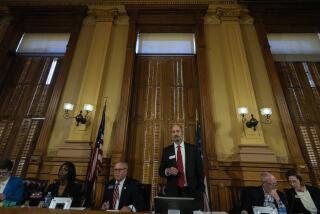Watching political sausage get made
- Share via
WASHINGTON — The question at Saturday’s Democratic Party hearing on disputed primaries was whether Hillary Rodham Clinton would emerge with any greater hopes for becoming her party’s nominee for president.
But for people listening to the daylong hearing of the Democratic National Committee’s rules panel, it was a peek under the hood of democracy -- and at one of its fundamental questions: How do you measure the will of the people?
It sounds simple. Even schoolchildren know how to hold a student council election: one kid, one vote.
But Saturday’s debate over how to treat the results of the Michigan and Florida primaries -- which could have given Clinton’s troubled campaign an eleventh-hour boost -- showed how messy the process can get.
Elections are driven by rules, which can change midgame. Voters may give ambiguous answers to simple questions, such as which candidate they prefer. The day was reminiscent of the civics lesson of 2000, when the presidential vote recount forced the nation to come to grips with the concept of “hanging chads.”
Clinton’s camp argued that the results of the Michigan and Florida primaries should be honored -- even though voters were told the results would not count because the states had violated party rules by holding their primaries too early.
“Let’s count every vote!” was the Clinton rallying cry.
Barack Obama’s allies argued that the Florida and Michigan results did not reflect the will of the people. Obama had followed the party’s edict and did not campaign in either state; his name did not even appear on the ballot in Michigan.
Allan Katz, an Obama supporter and rules panel member from Florida, called it an “Alice in Wonderland election.”
In 2000, Florida officials were left to divine the will of voters who had not properly completed their ballots.
On Saturday, questions about voter intent became almost metaphysical. As the only major candidate on the Michigan ballot, Clinton won that primary with 55% of the vote. How many of her voters would have chosen someone else if another choice had been offered?
About 40% of Michigan voters chose “uncommitted.” How many of them would have voted for Obama?
“You had an incomplete ballot” in Michigan, said the state’s Democratic Party chairman, Mark Brewer. “It did not give us a true picture of Democratic voters.”
Though 1.75 million Democrats voted in the Florida primary, Katz took pains to elicit agreement from a Clinton supporter that closer to 3 million would have voted had there been a true campaign in the state. By implication, he was asking how to honor the intent of those who had stayed home.
The Obama and Clinton camps disagreed sharply about how to arrive at a fair resolution. Clinton wanted the Michigan delegations to be seated in line with the state’s election results: 73 delegates for her and 55 marked as uncommitted, with none for Obama because he chose not to be on the ballot. Obama wanted Michigan’s delegates to be evenly split: 64 for him, 64 for Clinton.
Clinton wanted Florida’s 211 delegates to be seated according to the election results there, giving her 38 delegates more than her rival. Obama backed a plan to seat the delegates but cut their voting strength at the convention in half, netting Clinton a gain of 19 delegates.
The search for compromise seemed to leave some committee members frustrated.
Elaine Kamarck, a Clinton ally on the rules committee, objected that one Michigan proposal to split the difference between the two campaigns amounted to a “willy-nilly” assignment of delegates.
“This way lies chaos,” she said.
Donna Brazile, a committee member who ran Al Gore’s 2000 campaign, rebuked Clinton’s Michigan representative on the panel.
Brazile described herself as wanting to give the two states a voice at the convention, but “I also want to put on the record, because this goes to what my mama taught me . . . that when you decide to change the rules, especially [in the] middle of the game, end of the game, that is referred to as cheating.”
Cheers, boos and applause followed.
Brazile urged the panel to craft a compromise that would “pay tribute” to voters who wrote in candidates or did not go to the polls.
In the end, Clinton backers lost big in Michigan. The committee agreed to the state party’s suggested compromise: splitting the difference between Clinton’s and Obama’s positions, assigning Clinton 69 half-vote delegates and Obama 59 half-vote delegates.
Said Clinton advisor Harold Ickes: “This body of 30 individuals have decided they are going to substitute their judgment for 600,000 voters.” He was less critical of the compromise on Florida, which seated the half-vote delegates in line with the outcome of the state’s primary.
Obama’s campaign called the outcome a “fair solution.”
--
More to Read
Sign up for Essential California
The most important California stories and recommendations in your inbox every morning.
You may occasionally receive promotional content from the Los Angeles Times.














